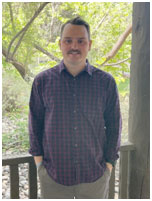2024 Bilinski Foundation Fellowship Recipients
Jessie Bonafede

Violence Condemned, Violence Condoned: An Analysis of Performative Chivalric Violence in the English Alliterative Romances
Jessie is a PhD candidate in English with a concentration in Medieval Studies at UNM. Her dissertation focuses on medieval literary depictions of chivalric violence and the knight’s masculine body in the English alliterative Arthurian romances of the Hundred Years War. She offers a new theoretical and methodological praxis for analyzing discourses of chivalric violence and gender which stem from her research into literary studies, genre studies, art and military history, anthropology, and sociology. Jessie's goal is to expand the critical scope of literary investigation to uncover where less recognized and more socially normalized arenas of violence occur, by whom,and why.
Jillian Grisel

The Cold War, Biosecurity, & Tuberculosis Control: The Formation of Indian Health Services within Imperial and Settler-Colonial Contexts
Jillian's dissertation examines the political, juridical, and ontological forces that shaped Indian Health Services during the mid-20th century, amidst the shifting global political landscape following World War II and the onset of the Cold War. Using a critical Indigenous critique, she argues that Indian Health Services functioned, and still functions, as an apparatus of the biosecurity state, solidified during this period by imperial and settler-colonial relations. Her project focuses on how the category of "Indian Health" was produced and utilized to serve imperial and settler-colonial agendas, particularly in relation to containing communism as tied to controlling Indigenous life under the guise of tuberculosis control.
She is interested in uncovering the punitive and carceral aspects of U.S. Indian health policies, revealing how they dispossess Indigenous nations and peoples from their lands. Drawing from an archive of Indigenous resistance and tribal sovereignty, she challenges settler-colonial frameworks of health, asserting that settler and biomedical categories of Indian Health cannot be contained.
Penelope Haulotte

Harmony & Disquietude: Leibnizian Currents in German Idealist Thought Building Nakota and Oceti
Penelope Haulotte is a Ph. D. candidate in UNM's philosophy department with a certificate in Women, Gender, and Sexuality Studies. She specializes in the history of classical German Philosophy as well as contemporary political philosophy. Her dissertation, Harmony & Disquietude, examines the underappreciated relationship between German Idealist thought and 18th century Leibnizianism, focusing on figures such as Gotthold Lessing, Salomon Maimon, J.G. Fichte, and G.W.F. Hegel. Penelope's research into contemporary political philosophy focuses on transgender history, theory, and activism, and her long-term goal is providing a systematic existential phenomenology of gender dysphoria.
Richard Maska

Sakowin Nationhood: Landownership, Economic Development, and Native Sovereignty on the Northern Great Plains, 1850-1933
Richard Maska is a Doctoral Candidate in the History Department specializing in Native American, borderlands, and North American West history with a focus on the Fort Peck reservation Nakota (Assiniboine) and Oceti Sakowin (Sioux) nations. Drawing on oral and archival materials, his community facing project traces the resilience of the Fort Peck nations as they navigated the imposition of reservation life and assimilationist policies. By focusing the role of kinship networks in Nakota and Oceti Sakowin approaches to land use, governance, and schooling, he hopes this work will bolster present-day assertions of sovereignty and self-determination at Fort Peck. Richard’s work was previously supported by generous grants from UNM, the Newberry Library, the American Philosophical Society, and Montana State University.
Chase McCarter

The Emotional World of Ex-Confederate Expatriates in Latin America, 1865–1870
Chase H. McCarter is a PhD candidate in the Department of History. Chase’s research interests include the U.S. Civil War and Reconstruction, the nineteenth-century U.S. South, nineteenth-century U.S.–Latin American relations, war and society, race and ethnicity, and the history of emotions. His dissertation examines the ex-Confederate expatriation movement to Latin America after the U.S. Civil War, using emotions as a lens of analysis to explore the affective factors that influenced ex-Confederates to choose exile abroad rather than face the sociopolitical Reconstruction of the South. Chase received his BA in History and MA in History from the University of Alabama.
Edrea Mendoza-Quintero

“Planificar es cuestión de querer”: Reproduction, Bodily Autonomy, and the State in 1970s & 1980s México
Edrea Mendoza Quintero is a Ph.D. candidate in the Department of History. Her research focuses on Mexican women in the twentieth century. Her dissertation is an exploration of how economic policy changes in Mexican law in the 1970s and 1980s directly affected women and their reproductive choices by placing their duties as citizens at the forefront of population control measures. She is interested in how these new government-led family planning initiatives were at the same time both a seemingly positive step in reproductive justice reforms and also an avenue to push state-sponsored propaganda and population control measures. Edrea is a first-generation student of color and the daughter of immigrants. She received her BA from the University of Denver and her MA from Louisiana State University.
Justin Pearce

Frantz Fanon's Critique of Violence
Justin is a PhD candidate in Philosophy at UNM. His research interests focus on 20th and 21st century social and political philosophy, particularly as it relates to questions of violence and non-violence. His dissertation is on Frantz Fanon’s Wretched of the Earth, a text which is often misinterpreted by readers as a naïve glorification of violent resistance to colonial oppression. Resisting these simplistic readings, the dissertation argues that Fanon’s work should be read as a critique of violence which rigorously thinks through the effects of violent oppression on individuals as well as the complexity and difficulty involved in meaningful resistance to that violence. Read this way, Fanon’s work offers valuable resources and methods for more carefully thinking about violence, oppression, and liberation in new contexts in the 21st century.
Haley Steffens

An (Un)Assimilated Nation: Immigration & Assimilation, Autobiographies & Fictions of the Nineteenth Century
Haley Steffens is a Ph.D. Candidate in American Literary Studies in the Department of English Language & Literature at UNM. Her field of study addresses immigration and assimilation patterns in North American literature from the nineteenth century into the early twentieth century. Her dissertation, An (Un)Assimilated Nation, interrogates varied assimilation experiences in the United States during the nineteenth century, as reflected in literature, and perpetuated culture and ratified by law. Haley’s project approaches the assimilation processes and practices of the period through the experiences of several disparate authors categorized under three groupings—what she calls willing assimilation, resisted assimilation, and non-participatory assimilation.



